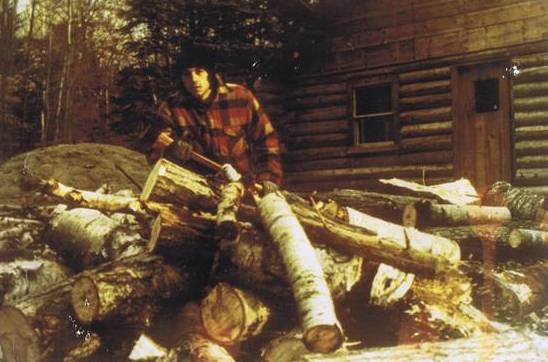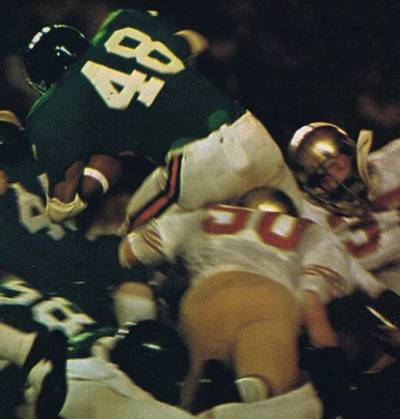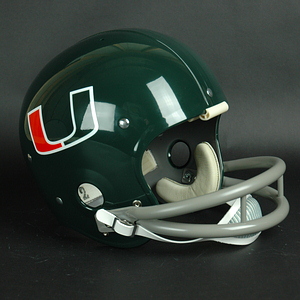

"A Vivid Memory"
HELMET HUT NEWS/REFLECTIONS October 2011:
A Vivid Memory
By Dr. Ken
As every football season approaches, like almost any male who participated in high school and/or collegiate football, my levels of excitement and adrenaline begin to increase. “Football season” for me always began in May. This would be the time to start the very serious preparation for fall camp. Especially in college after classes had ended, work had begun at whatever summer job or multiple jobs I held, and the hours of toil in our garage gym intensified, I would be reminded of my responsibility to be in the best physical condition possible. Running on the beach, traversing steep sand dunes, and sprinting in both knee and waist-deep water put the “finishing touches” on the preparation period for the few fellows I knew who also played and were as serious about the endeavor as I was. Decades later it takes little more than the specific “feel of fall” in the air, the observation of one of our trainees performing a particular exercise in a certain manner, or conversation at the Rockville Centre Starbucks that involves the past weekend’s games to bring about many of the same physical feelings and emotional responses that I had from the late 1950’s through the mid-‘70’s. My wife, as a former college athlete who starred in multiple sports in The Big Ten Conference, at least understands and is also smart enough to quickly remind me that men in their sixties cannot seek out an opportunity to play tackle football, “especially with no eligibility left.” If there are specific emotions that are evoked by the football season, the month of October, for me, intensifies these.
Without
the
laundry
list
of
reasons
that
made
it
fitting
for
me
to
pursue
months
of
work
as a
lumberjack
in
the
wilds
near
Solon,
Maine
in
August
of
1973,
I
found
myself
in a
unique
situation.
The
small
log
cabin
I
inhabited
had
not
been
completed.
I
spent
most
of
my
waking
hours
the
first
three
days
there
pounding
oakum
into
the
open
spaces
between
the
logs.
Oakum
is a
tarred
rope
that
was
routinely
used
in
the
Northeast
and
by
shipbuilders,
to
caulk
and
seal
the
spaces
between
wooden
planks
and
boards.
Because
the
floor
was
only
partially
finished
and
much
of
it
was
dirt,
I
spent
another
day
setting
cinder
blocks
and
shoveling
freshly
dug
soil
around
the
perimeter
of
the
cabin
to
prevent
the
wind
and
cold
from
entering
from
floor
level.
Another
day
was
spent
on
securing
the
planking
to
complete
a
reasonably
useable
floor.
The
abrupt
drop
in
temperature
in
the
evening
indicated
that
anyone
who
came
up
to
Maine
and
was
dependent
upon
a
fireplace
as
their
sole
source
of
heat,
would
be
in
dire
straits
if
they
did
not
have
months
worth
of
wood,
cut,
prepped,
and
dried
for
the
constant
fire
that
would
be
necessary
to
keep
the
cabin
warm.
As
there
was
zero
inventory
of
wood
that
had
been
made
available,
my
next
week
was
spent
starting
to
build
a
bit
of a
surplus
because
the
fireplace,
used
for
both
heating
and
cooking,
was
voracious
in
its
need.
I
was
obviously
behind
the
eight
ball
from
the
first
minute
I
stepped
onto
the
property.
 |
The author, “self photographed” deep in the Maine woods, 1973
Once settled into a daily routine of filling a backpack with hand tools, chain, mauls, and wedges, strapping two chain saws to my torso, and carrying an ax and peavey into the woods to begin a twelve hour day of cutting previously marked trees on the densely wooded ninety-two acre spread, I rarely forgot that it was football season. Trees would be felled, trimmed, and then wrapped in chain. I would hook the chain to a leather harness and drag the downed tree through the difficult, rocky terrain to two collection points I had established at the front of the property. In the spring, the lumber company would come in for collection. Working from 5 AM until it became too dark to safely be out in the forest, I would return to the cabin and begin my “second job” which entailed the cutting of wood to heat the barren, drafty structure. The hard physical work, especially the dragging of what were often up to twenty foot long sections of trees, over and through impossible ground and brush reminded me of trying to push the pile of defenders massed to prevent the one or two yard gain needed for a first down. Football was never far from my mind but I was without it as the cabin and property, separated from the nearest neighbor by over six miles, was truly isolated from civilization. I had resigned myself to being out of the loop from any form of football until the glorious day of October 20, 1973.
I spent most evenings reading by the light supplied by a kerosene lamp. As would be expected, the “library” I had taken to Maine with me included primarily football, coaching, and physiology related books and materials. I had a small radio in my possession but buried in mountainous and wooded terrain, I had failed to pick up anything more than static in the two and a half months I had been in effective exile. I was at a complete loss as to the progress of the professional and collegiate seasons. For reasons still not clear to me, I chose this specific evening to again try to coax reception from the radio. My shock would have been immediately noticeable if I had anyone present to observe me as the radio began to describe the upcoming kickoff for the Boston College vs. the University of Miami game. The fact that I was able to get radio reception was an anomaly. That I would get it just as a football game was starting and that BC’s game was being broadcast from Miami, Florida, made the situation all the more bewildering but I was quite excited. Neither program was top-rated but it was expected that Boston College would play solid football. A perusal of the HELMET HUT seasonal summaries for Miami [ http://www.helmethut.com/College/Miami/UM7375.html ] quickly reveals that the football situation in Coral Gables was in flux. Money was tight, head coach Fran Curci who had brought some stability and talented athletes into the program had jumped to Kentucky, and the new head coach Pete Elliot, was considered a retread having moved over from his office as Assistant Athletic Director. Boston College was always a respected program with mostly winning records under the guidance of Mike Holovak, Jim Miller, and current coach Joe Yukica but had not had true football glory since the days of Frank Leahy which preceded our entry into World War II.
Though I was admittedly short of my usual degree of compulsively gathered pre-season football information, and totally clueless about the results of the ’73 season to that point in time, I did know that Gary Marangi was the Boston College quarterback and a few other Long Island players dotted their squad. Marangi had played at Elmont High School, one of Malverne’s regularly scheduled opponents and he had been excellent against us and most others he had faced. Other than Rubin Carter, a massive defensive lineman, I knew little about Miami’s squad, the newsworthy emphasis being on the political and financial difficulties they had faced for the previous number of seasons. One of my best players, a sophomore running back by the name of Paul Bretton, had moved to Florida and played at Stranahan High School shortly after Carter had starred there, thus I already had some background information about the highly regarded noseguard who could bench press 500 pounds. The leader of the offensive line was future Rams great Dennis Harrah but after an abrupt change in coaches, little was expected of Miami who had to face off against Texas, Oklahoma, Alabama, and Notre Dame among a long list of top schools.
As I sat outside near the wood pile under a frigid, damp, and pitch-black sky, typical for fall in that area of Maine, I was amazed at my good fortune. The game was exciting and despite their underdog status, the Hurricanes were in it from the beginning. It seemed that their string of losing records, reports of player unrest, and the threat of having the program extinguished were forgotten. Miami had already startled the football world, having defeated Texas on opening day and battling mighty Oklahoma closely in a 24-20 loss. Of course this information came to me as the game progressed but it enhanced my enjoyment knowing that the ‘Canes had “the stuff” to compete well with BC. Mike Esposito, the leading rusher for Boston College who later played with the Falcons was bottled up except for a spectacular 100 yard kickoff return. Miami countered with Erie, Pennsylvania’s Woody Thompson who had previously set a Big 33 Game scoring record. Thompson, who like Esposito spent some time with the Falcons, was a thumper who allowed Miami to control the clock and carried most of the load on the late winning touchdown drive.
 |
Miami’s Woody Thompson hammers Boston College on October 20, 1973
It might have been the absence of football that made this game such a treat for me but on its own, the 15-10 Miami upset would have been memorable, at least for Hurricanes fans. Thompson was injured later in the year but still finished the season with over 800 rushing yards. Carter of course went on to a great career with the Denver Broncos and Harrah with the Rams, both appearing in numerous Pro Bowls.
Throughout the entire game I was reminded of the wonderful radio announcers who were charged with bringing the pageantry and detail to listeners without the benefit of anything more than their voiced observations. I pictured the white Boston College jerseys trimmed in maroon and gold with their classic gold helmets. Miami had maintained their forest green helmets with the “U” logo on each side but had altered it slightly from the previous season so that it was now a “two-tone” combination of orange and green.
 |
Unlike the feared teams “The U” would put on the field in later years, their program now reflected the decline in finances, facilities, player relations, and fan attendance that threatened its termination. This alone had me pulling for the underdog in what turned out to be one of the most exciting games in a season marked by notable upsets. My enjoyment of football reached a higher level the following day as the radio brought the Patriots and Bears game into my temporary home. It’s fortunate that I enjoyed that contest as much as I had the BC and Miami game because these would be the final, and only games I would have contact with for the entire 1973 season.